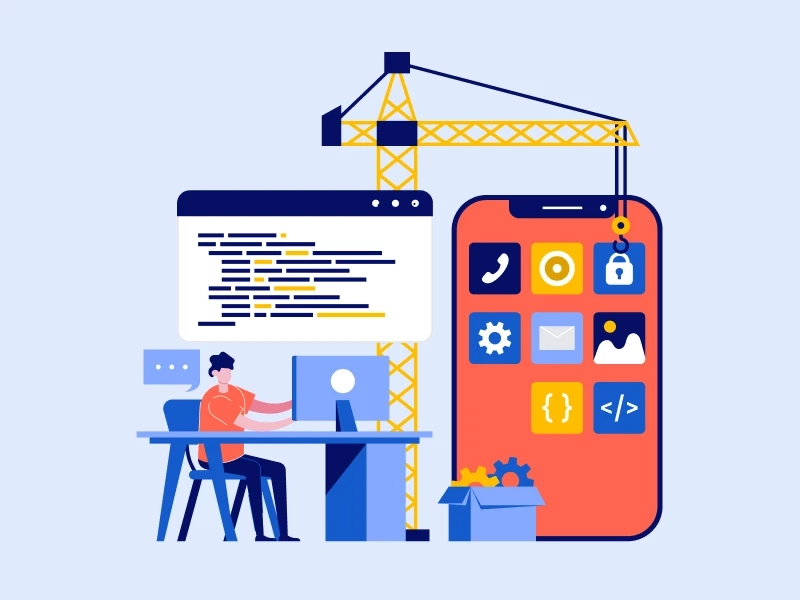Creating a mobile app is hard. One very important choice is the tech stack. This choice matters a lot. It impacts the app's speed, growth, and success. To make the best choice, you must understand basics of tech stack.
You must look at needs of your project. Think about native or cross-platform app, scalability, safety, and money. Hiring skilled mobile app coders is key too. This overview looks at all these details to help you make a good decision.
Understanding the Basics of a Tech Stack
A tech stack is all the stuff used to build a mobile app. This includes code languages, frameworks, libraries, and tools. It has two main parts: the front-end and the back-end. The front-end is the user's view and experience. The back-end manages data, logic, and servers. Your tech stack choice impacts the app from start to finish.
Front-end tech shapes how users interact, like design and speed. Back-end tech makes sure data is safe, smooth, and works well. This basics knowledge is super important as it directly impacts app performance, user happiness, and project success.
Analyzing Your Project Requirements
Before you pick a tech stack, look closely at the app you want to build. Is it simple with basic tasks, or does it need complex features and integrations? The users matter too. Are they tech-savvy, or do they want an easy app?
Will the app be for iOS, Android, or both? This choice affects your tech stack options. Also list out what features the app needs - user login, data sync, AR, and more. Each feature has its own tech needs. By looking at all these things carefully, you can find the right tech stack that fits your project and helps it succeed against other apps.
Read more: 65+ Top Mobile App Development Ideas in 2024
Pros and Cons of Native vs. Cross-Platform Development
For native apps, iOS and Android need separate code. This can give great performance and a smooth user experience for each OS. But it takes more time and money to make and maintain two codebases.
Cross-platform lets you write one codebase for multiple platforms. This saves time and money. But it may not perform or integrate as well as native apps. Choose based on your budget, timeline, desired performance, and what user experience you want to provide.
Key Technologies for Mobile App Development
When you make apps for phones, you need good tools. For Apple phones, Swift is a good language. It has great things and is easy to use. For Android phones, developers like Java or Kotlin. Kotlin is nice because it has short code and works with Java.
Some tools let you make apps for many devices with one code. React Native from Facebook lets you make native-like apps using JavaScript and React. Xamarin uses C# and .NET to make apps that work well and look good. Flutter from Google uses Dart to make native apps for phones, web, and computers from the same code.
These tools have pros and cons for speed, performance, and user fun. Picking the right combo is key to meeting your app needs and launching it well.
Considering Scalability and Future Growth
As your app grows, your tech should too. As more people use it, your tools must let it grow smoothly. This means handling more users but also adding new features people want. Choose tools that can scale up without trouble.
Tools with cloud services, good data flow, and quick changes are best for scalable apps. Investing in scalable tech now saves time and money later.
Read more: How Much Does It Cost To Make An App In 2024?
The Importance of Security in Your Tech Stack Choice
Security is very important when picking tools for your app. This will protect user data and stop hackers. Look for strong encryption and safe logins to help stop data breaches. Applying updates regularly will also add safety.
Having great security shows you care about users. It makes your app more reliable. Think about laws too, like data rules, when picking security steps.
Budget Considerations When Choosing a Tech Stack
Cost matters when picking app tools. First cost and future costs are key. Some tools are cheap now but cost more later for updates. License fees also vary a lot. Skilled workers for some tools cost more too.
Things like test helpers or cloud hosting may save money overall though. Think through all costs to pick tools in your budget while still doing a good job.
Finding and Hiring Top Mobile App Coders
To make a very good mobile app, you need great coders. Look for people who know the tech you want to use. See if they made other good apps before.
Talk to coders online and in person. You can hire coders to work for you or pay others to do some of the work. When you meet coders, make sure they can code well and work as a team. Pick coders who can turn your ideas into a real app.
Looking for top mobile app development services in India? Hire us for expert guidance in choosing the right tech stack for your mobile app!
Wrapping up
Picking how to build your mobile app is super important. Think about what you want the app to do. Some tech is better for certain apps. Native apps use a phone's built-in tools and run smooth. Cross-platform apps work on many devices but may not work as well.
As your app grows, make sure the tech can grow with it. Keep users safe with good security. Have a plan for how much to spend. After picking the tech, find great coders. They will make your app idea come alive. As tech changes, your app can change too if you plan ahead.


